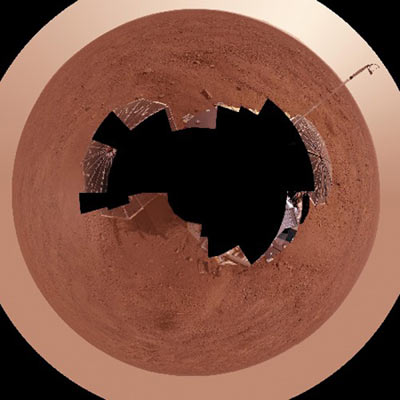Mission scientists of NASA's Phoenix Mars Lander reported on Thursday that an instrument aboard the spacecraft has identified water in a soil sample.
|

|
|
A full circle panoramic view of Mars taken by NASA's Phoenix Mars Lander is shown in this undated handout photo released to Reuters July 31, 2008. NASA scientists said on Thursday they had definitive proof that water exists on Mars after further tests on ice found on the planet in June by the Phoenix Mars Lander. (Xinhua/Reuters Photo)
|
The lander's robotic arm delivered the sample Wednesday to an instrument that identifies vapors produced by the heating of samples.
"We have water," said William Boynton of University of Arizona in a statement released by NASA on Thursday. Boynton is the lead scientist for the instrument, Thermal and Evolved-Gas Analyzer, or TEGA.
"We've seen evidence for this water ice before in observations by the Mars Odyssey orbiter and in disappearing chunks observed by Phoenix last month, but this is the first time Martian water has been touched and tasted."
With enticing results so far and the spacecraft in good shape, NASA also announced on Thursday that the operational funding for the mission will extend through Sept. 30.
Phoenix touched down at a northern Mars plain on May 25. The original prime mission of three months ends in late August.
"Phoenix is healthy and the projections for solar power look good, so we want to take full advantage of having this resource in one of the most interesting locations on Mars," said Michael Meyer, chief scientist for NASA's Mars Exploration Program.
The soil sample came from a trench approximately 5 centimeters deep. When the robotic arm first reached that depth, it hit a hard layer of frozen soil. Two attempts to deliver samples of icy soil on days when fresh material was exposed were foiled when the samples became stuck inside the scoop.
Most of the material in Wednesday's sample had been exposed to the air for two days, letting some of the water in the sample vaporize away and making the soil easier to handle.
"Mars is giving us some surprises," said Phoenix principal investigator Peter Smith of University of Arizona. "One surprise is how the soil is behaving. The ice-rich layers stick to the scoop when poised in the sun above the deck, different from what we expected from all the Mars simulation testing we've done. That has presented challenges for delivering samples, but we're finding ways to work with it and we're gathering lots of information to help us understand this soil."
Since landing on May 25, Phoenix has been studying soil with a chemistry lab, TEGA, a microscope, a conductivity probe and cameras. Besides confirming the 2002 finding from orbit of water ice near the surface and deciphering the newly observed stickiness, the science team is trying to determine whether the water ice ever thaws enough to be available for biology and if carbon-containing chemicals and other raw materials for life are present.
The mission is examining the sky as well as the ground. A Canadian instrument is using a laser beam to study dust and clouds overhead. A full-circle, color panorama of Phoenix's surroundings also has been completed by the spacecraft.